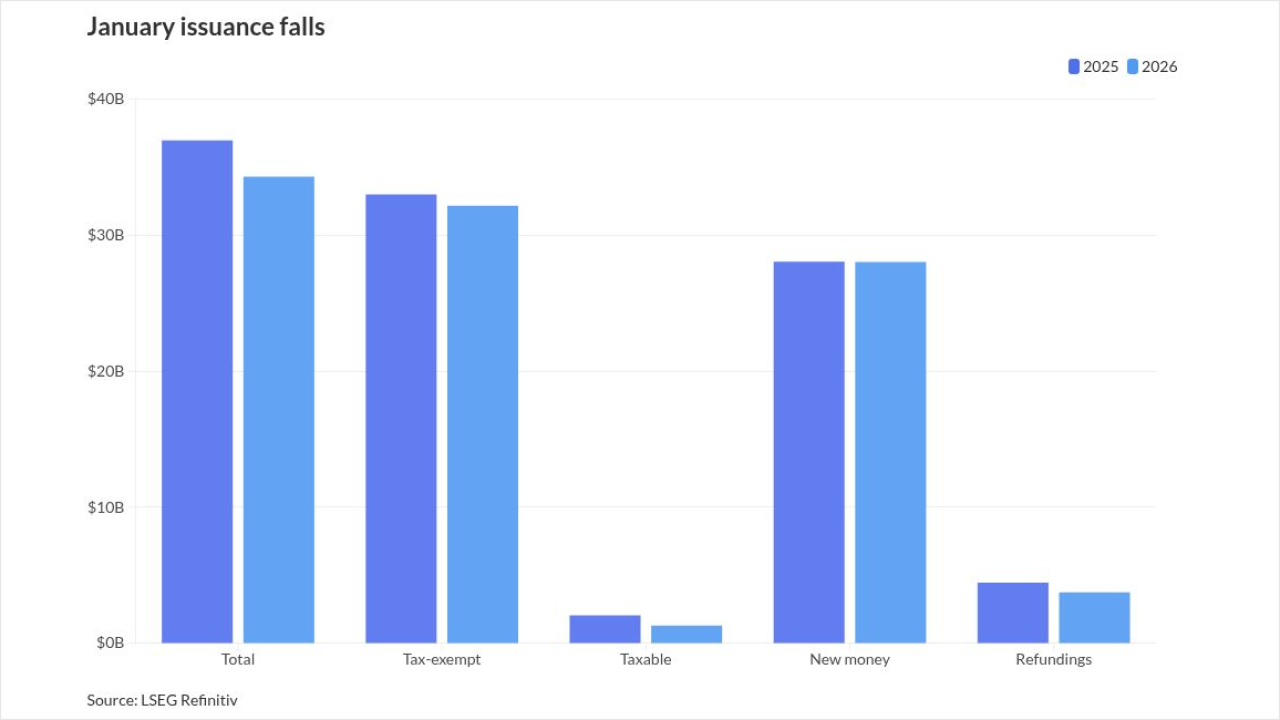
CHICAGO – Chicago expects the veto-proof passage by early April of state legislation to save its municipal and laborers' pension funds from insolvency, the city's finance chief told investors Monday.
"We are pretty confident or optimistic ….we would have enough votes to override," chief financial officer Carole Brown said in an investor call following Gov. Bruce Rauner's Friday veto of the original legislation written to put in place revised funding formulas for two funds.
Brown highlighted the strong bipartisan votes on the original legislation and the city's belief that the overhaul solves the pension funds' near-term crises.
One market watcher countered that given the rising partisan tensions there's no guarantee of future cooperation.
The original bill is now dead because it was approved by a prior legislature. In anticipation of a possible veto due to the partisan political gridlock that's driving a nearly 22-month-old state budget impasse, Senate President John Cullerton, D-Chicago, introduced an identical bill after the new legislature was seated in January. The Senate approved Senate Bill 14 in a 38-to-11 vote on Jan. 25.
The bill is set for a House committee hearing on Thursday, setting the stage for a possible vote next week, Steve Brown, spokesman for House Speaker Michael Madigan, D-Chicago, said Monday.
Democrats hold majorities in both chambers. The Senate holds a veto-proof three-fifths majority but the House split is 67-51in favor of Democrats and 71 votes are needed for an override to succeed.
The vetoed bill passed the House in December on a 91-16 vote and the Senate signed off in a 41-0 vote in early January.
"This is another kick-the-can approach to pension funding that landed Chicago in fiscal crisis in the first place," Rauner said when he vetoed the bill. "This bill will create an unsustainable funding schedule that will lead to tax increases without solving the real problem."
Rauner wants city reforms to be part of a larger, statewide package that includes state pensions and other local governments, but a path to such changes is unclear. The state Supreme Court has shot down as unconstitutional past city and state plans that cut benefits.
The state is faced with steadily rising contribution demands to address $126.5 billion of unfunded obligations, but the municipal and laborer funds' woes are more acute because they are headed toward insolvency in the coming decade without changes.
Brown called some pieces of Rauner's statement erroneous and defended the plan.
"We do not feel we are kicking-the-can….we are hardwiring" actuarially required contributions in 2022, Brown said. "We think that is responsible and ensures" the plans will be on more solid ground going forward.
Even if the bill retains strong bipartisan support in its first House vote, there's no guarantee GOP votes will remain for a potential override.
"I just think the politics just over the last week have gotten so fractious it's hard to imagine more bad things not happening to the city and state's credit profile," said Matt Fabian, partner at Municipal Market Analytics. "The level of chaos is rising and Chicago will be dragged into that and it undermines the city's narrative" that it's turned a fiscal corner.
A sweeping bipartisan Senate budget fix has stalled and Rauner's feuding with Democrats has escalated of late with harsh words exchanged with Mayor Rahm Emanuel and state Comptroller Susanna Mendoza.
Final passage of the new bill would only bring the city back to where it was before the veto. If the reforms are not soon enacted, the funds' weak condition would continue to deteriorate.
City bonds could suffer some lost value in secondary market trading and some investors might shed holdings over concerns, but the near-term impact should be limited. The city paid a steep penalty of more than 300 basis points on its general obligation sale earlier this year, but does not plan another GO borrowing until 2019.
The bigger risk lays in state credit developments. If the state's budget impasse drags into a third fiscal year July 1 its investment grade rating is at risk and that would have a trickle down impact on the city, Fabian said.
Emanuel won City Council approval for a new water-sewer tax to fund higher contributions to the municipal fund last year. An emergency phone surcharge is in place to cover higher payments to the laborers' fund.
The city's combined $33.8 billion of net pension liabilities in its four funds have dragged its ratings down to a low of
The legislation would enact funding scheme changes for Chicago's municipal employees' and laborers' pension funds designed to stave off the insolvency expected under the current statutory contribution formula. It would put the funds on a path to a 90% funded ratio in 2057, city officials say.
After a five-year ramp of increasing city contributions, the city commits to making an actuarially based contribution. The current formula, which has allowed the funds' health to falter, is based on a multiplier tied to recent employee contributions.
Enactment of the state law would mark the final step in putting the city's pension fixes in place.
The contribution schedule closely mirrors one previously approved by lawmakers for the city's other two funds, which cover police and firefighters. Rauner vetoed the city's overhaul of the city's public safety reforms last year but an override succeeded with the help of some House Republicans.
After 2022, the city's proposed funding scheme will fall short of what's needed and improved funded ratios will take decades to achieve. Critics attacked the plan for those two shortcomings. The city carries ratings between Ba1 and BBB-plus.
When asked about his veto during a public appearance Monday, Rauner called the overhaul a bad deal for taxpayers because the plan lacks reforms and will require rising payments. He accused Emanuel of trying to "dump" future funding of city pensions on to his successor. "Guess who's not going to be mayor in 2023?" Rauner said. Emanuel has never said how many terms he intends to seek and does not face term limits.





